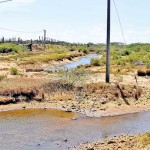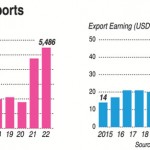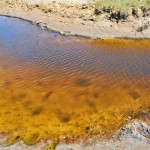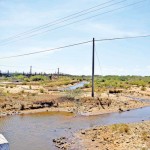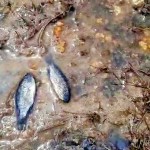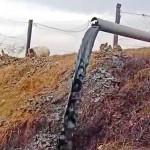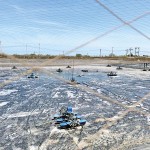News
Shrimp farm wastewater breaches environmental laws
View(s):By S. Rubatheesan in Vidathaltheevu, Mannar
His friend had just witnessed a dark-coloured effluent being pumped out from the private-run Vanamei shrimp farm on the 88th milepost of the A32-Mannar road, opposite the protected Vidathalthivu natural sanctuary.
Alarmed by the news, he rushed to the spot with fellow fishermen. To their horror, they witnessed poisonous waste water contaminating the waterway that passes through a sanctuary and fish banks suffocating to death. On his phone, he recorded what he observed.
- Contaminated water in the stream days after the incident
- The waterway canal
- J.S. Suresh
- Alphonsus David
- From video grab: Fish dying in effluent- contaminated stream
- Video grab by fishermen: Black effluent being pumped out from the farm
- Inside the farm: Post-harvest work of shrimp farming underway
“We have never seen anything like that before in our area. The effluent was black and had a bad smell. They must have started pumping out late at night since it had got mixed up with the waterway that passes through the sanctuary by the time we visited,” Suresh, who heads the Vidathalthivu Rural Fishermen Society, told the Sunday Times.
Concerned fishermen informed government officials immediately with photographic evidence demanding urgent action against the company, Taprobane Seafoods Pvt. Ltd., a leading seafood processing company and exporter, which claimed to farm disease-free shrimp broodstock through a hatchery.
When the fishermen went back the following day to collect samples of the water on a request by government officials, there was hardly any evidence left.
Even weeks after the incident, seven fishermen’s societies that make up the Manthai West Fishermen Cooperative Societies Union have been demanding legal action with little success against the private company for damaging natural marine resources and putting the livelihoods of some 350 fisherfolk families under threat.
Alphonsus David, a veteran fisherman representing the union, said even before the company planned its construction, they were opposed to setting up such a farm near a natural sanctuary that connects with the Vidathalthivu lagoon, where they have been engaged in fishing for generations.
“Earlier we used to get at least 300 kg of fish catch per boat, but nowadays it is not even 10 kg. With this recent disaster, our livelihood is uncertain,” David said, noting that due to this factor, several fishermen have opted for sea cucumber farming, sea grass harvesting, or switched to other labour jobs.
On August 28, the regional Fisheries Department in Mannar sent a communiqué to its head office in Colombo following a field study of the location that confirmed the traces of effluent discharged around the farm and the waterway.
Some of the stagnant tanks at the farms were found to be unusually coloured and smelt bad. A pool of water was found near the farm along the waterway. The stagnant water near the farm was dark brown in colour,” according to the Communique, seen by the Sunday Times.
When the Fisheries Department officials inquired from the manager of the farm about the change in colour of the water, they were informed, as per the communiqué, that “the concentration of salt was high [in the waterway]’’.
The department also observed that it could not collect evidence of discharged black effluent and lacked expertise to check the water quality while recommending further analysis by other relevant government bodies such as the National Aquatic Resources Research and Development Agency (NARA), Marine Environment Protection Authority (MEPA), and Central Environmental Authority (CEA) over the incident.
NAQDA’s Assistant Director (Coastal) for the northern province, B. Nirooparaj, said he had called for comprehensive reports from relevant agencies over the matter, and once reports are received, further action will be taken.
The commercialised vannamei-whiteleg shrimp farming industry has a significant impact on the environment and sustainability as an industry, according to a fact sheet by the Food and Agriculture Organization (FAO).
Pollution of coastal waters by pond effluents, farm discharges causing self-pollution in shrimp growing areas, and the “slash and burn style” use of ponds for a few years before moving to new areas are some of the concerns highlighted by FAO, along with salinisation of groundwater and agricultural land in the surrounding areas.
The Sunday Times learns through officials who were part of the preliminary investigations by various agencies that the private company violated the environment protection regulations by discharging effluent without prior notice, failing to do water treatment and recommended legal action.
Under the amended Fisheries and Aquatic Resources Act No. 02 of 1996, Section 2, the entity can be charged and fined Rs 25,000 for discharging effluent into waters without prior information and violating the environmental regulations under Sections 6 and 47, unless heavy penalties are requested by authorities.
Ayngaranesan, a northern-based environmentalist and former provincial minister of agriculture, livestock, irrigation, and environment, said both private and international organisations continue to exploit the natural fisheries resources for profit without considering the environmental impact.
Recalling how the currently lapsed Northern Provincial Council rejected a multi-million rupee project to set up a “leather city” in Mannar considering its environmental sensitivity, he noted that in the absence of local councils and PCs, the Central Government is leasing out investment projects without taking into consideration critical environmental concerns and local communities. “If environmental concerns are overlooked for mere profits, it eventually will lead to a disaster, just like the shrimp farming industry collapse in Puttalam area years ago. And we depend on the ocean and land for survival in the region.’’
On Friday, Fisheries Minister Douglas Devananda called for a meeting with senior officials of NARA and NAQDA on the management of shrimp farms. Recent environmental concerns in Mannar and Puttalam were raised as well.
“Before the company was set up, they assured us many things, such as infrastructure development and providing employment to youth in our village. Nothing happened, and not a single person from our village is employed at the company now,” vice secretary of the Vidathalthivu Fishermen Society, Emilian Edison, said.
The fishermen’s community also expressed concerns that the company was planning to expand in the district. “We are told that they are planning to set up a new farm in the vicinity since the existing one cannot be used for long due to continuous chemical and fertiliser usage. We will never allow that to happen.”
Taprobane Seafoods insists on compliance
Rejecting the allegations by fishermen groups, the company Taprobane Seafoods Pvt Ltd said that the “fish shown in the video were found in the water used for reservoir cleaning by the farm and they are prone to dying due to pumping’’.
Stressing that the farm is fully compliant with all relevant legal requirements, including environmental regulations, the company ruled out that it does not discharge any effluent into the environment, and prioritises water recycling to address the issue of water scarcity.
“We do constant reservoir washing, which does not flow into the Vidathalthivu protected sanctuary or the sea; it is contained within our reservation area. We grow fish in our reservoirs to keep the water fresh and part of the biological treatment,” the company said in a written response to a questionnaire sent by the Sunday Times.
The company which is certified by International Organization for Standardization (ISO), Best Aquaculture Practice (BAP) standards, and is said to be pursuing Aquaculture Stewardship Council (ASC) certification confirmed “that there has been no practice of negligence in its farms’’.
“It is worth noting that during peak summer the Vidathalthivu sanctuary does not support fish populations due to factors such as high salinity, limited rainfall, less tidal action and high summer temperatures,” the company said while stressing that fish deaths in canals are a common occurrence during the summer months, primarily due to elevated salinity levels, high temperatures and reduced tidal action.
The best way to say that you found the home of your dreams is by finding it on Hitad.lk. We have listings for apartments for sale or rent in Sri Lanka, no matter what locale you're looking for! Whether you live in Colombo, Galle, Kandy, Matara, Jaffna and more - we've got them all!


